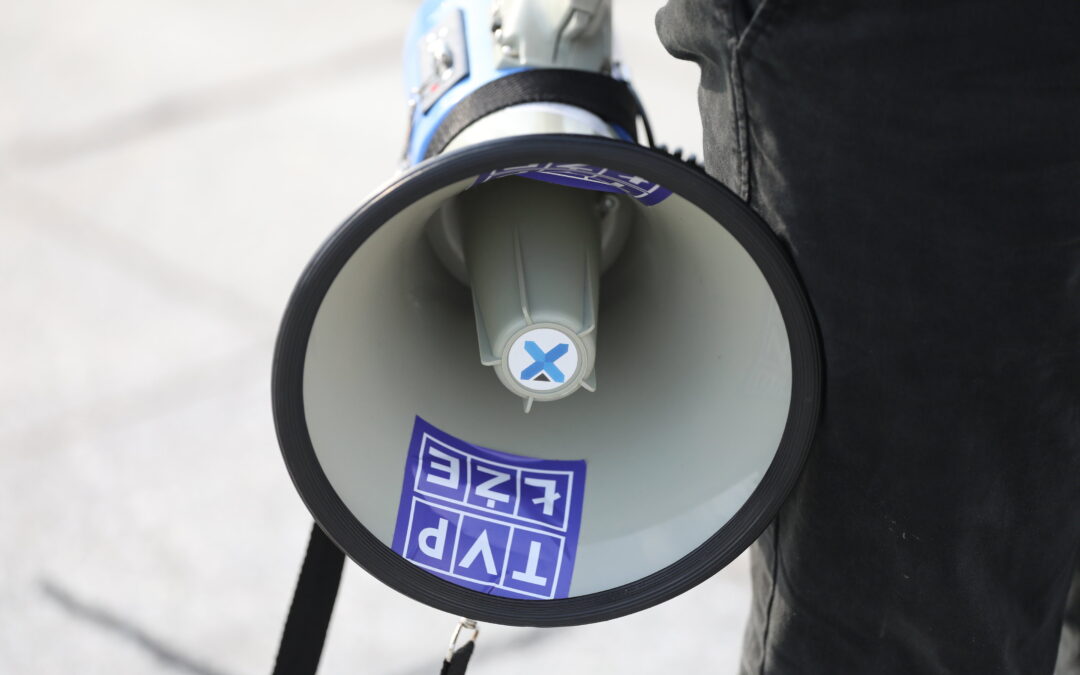Poland’s state broadcaster, TVP, is the least trusted of the country’s main news sources, an international study has found. The finding echoes other polling about the channel, which has become a mouthpiece for the ruling national-conservative Law and Justice (PiS) party.
In its latest Digital News Report, published today, the Reuters Institute for the Study of Journalism and the University of Oxford conducted surveys on how news is consumed in 46 countries around the world.
The findings for Poland showed that, of 15 major news outlets, the least trusted was TVP. Just 36% of Poles trust the broadcaster, while 46% distrust it. The next least trusted sources were PiS-friendly newspaper Gazeta Polska (38% trust) and tabloid Super Express (39%).
At the other end of the scale, the most trusted outlets were: radio station RMF FM (68%), owned by the German Bauer Media group; TVN (64%), a broadcaster that is part of the American Discovery group; and Polsat, a TV station owned by Zygmunt Solorz-Żak, one of Poland’s richest men.
Zaufanie do największych marek medialnych w Polsce według nowego raportu Reuters Institute @risj_oxford w Oksfordzie:
1. RMF FM
2. TVN
3. Polsat
4. Radio Zet
5. OnetTVP na ostatnim miejscu.
Opracowanie @sardanapal. pic.twitter.com/FlH8RJJp9k
— Jakub Krupa (@JakubKrupa) June 23, 2021
While Poland’s public media are statutorily obliged to be balanced and politically neutral, in practice they have always been under the influence of whichever government is in power.
However, since the return to power of PiS in 2015, state broadcasters – in particular TVP, which is headed by a former PiS politician – have been politicised to an unprecedented degree. News broadcasts are used to promote the government’s narrative and to attack its opponents.
During last year’s presidential elections, the channel repeatedly praised the incumbent, PiS-backed Andrzej Duda, while attacking his main rival, Rafał Trzaskowski, whom TVP accused of working on behalf of a “powerful foreign lobby” linked to George Soros and of seeking to “fulfil Jewish demands”.
OSCE election observers noted that TVP’s “biased, xenophobic and antisemitic” reporting had “undermined voters’ ability to make an informed choice”. Under PiS, Poland has fallen to its lowest ever position in the annual World Press Freedom Index, while separate polling shows that public trust in TVP has reached its lowest ever level.
In its report on Poland (written by a journalist from Gazeta Wyborcza, a leading liberal daily that is critical of the government), the Reuters Institute noted that “public service broadcasting acts as a propaganda vehicle for government”.
it also observed that 2020 had seen PiS continue to “pursue its radical agenda…with the pandemic providing further impetus for its moves to redraw Poland’s media landscape”.
This included “the state start[ing] to extend its control over private media” through the purchase of hundreds of local media outlets by state oil giant Orlen; the channelling of state advertising money towards friendly newspapers; and the launching of dozens of lawsuits against independent outlets.
The report states that “foreign ownership has…been an important bulwark of independence in a difficult environment for local media”, but that this is now threatened by PiS’s efforts to “repolonise” the media by seeking to limit foreign ownership.
The Reuters Institute’s survey also found that the most consumed traditional (TV, radio and print) media in Poland were TVN, Polsat and RMF, while the most popular online platforms were Onet, Wirtualna Polska and TVN’s news website.
The largest proportion of Poles (84%) consume news online, followed by TV (70%), social media (59%) and print (17%). The figures for TV and print have fallen from 81% and 28% respectively in 2015.
Among all countries surveyed, Poland had one of the highest proportions of people who have paid for online news in the last year, with 18% saying they had done so (compared to 30% in Sweden, 21% in the US, 13% in Canada, 10% in Japan, 9% in Germany and 8% in the UK).
Almost half of Poles (48%) said that they trust most news most of the time. That was higher than any other country surveyed in central and eastern Europe, but lower than most in western and northern Europe. The most trusting were the Finns (65%), Portuguese (61%) and Dutch (59%).
Poland did, however, have one of the highest rates of concern about politicians spreading misleading information about the COVID-19 pandemic. Among Poles, 41% expressed such a view, the same level as in Brazil (41%) and well above the global average of 29%.
Main image credit: Slawomir Kaminski / Agencja Gazeta

Daniel Tilles is editor-in-chief of Notes from Poland. He has written on Polish affairs for a wide range of publications, including Foreign Policy, POLITICO Europe, EUobserver and Dziennik Gazeta Prawna.




















